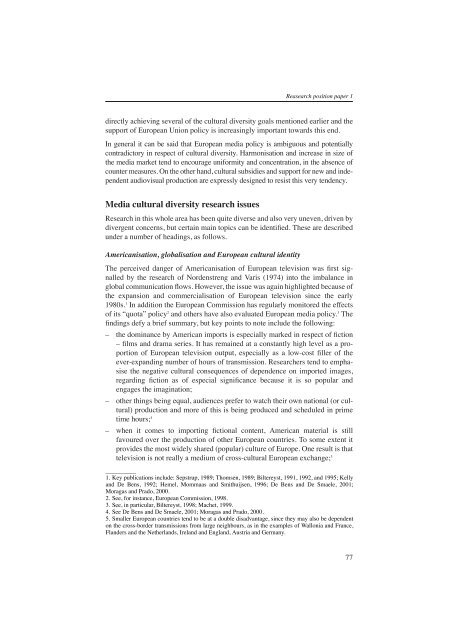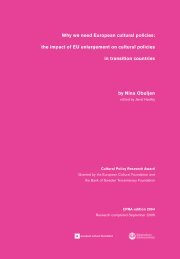<strong>Differing</strong> <strong>diversities</strong>service various minorities and maintain programme diversity. In the UnitedKingdom, for instance, Channel 4, launched in 1982, has a statutory obligation to<strong>of</strong>fer programmes that are different from Channel 3 (ITV) and to serve a diverserange <strong>of</strong> interests and groups. There is also a Welsh language version <strong>of</strong>Channel 4. In Germany, many <strong>of</strong> the state broadcasting regulations specify diversity<strong>of</strong> programming as a requirement and provision for minorities. In some cases,advisory councils <strong>of</strong> viewers have to be consulted in order to achieve access andbalance. 1<strong>Europe</strong>an media policy has also been dominated by an economic rather than a culturallogic, despite early ambitions to try to forge some kind <strong>of</strong> shared “<strong>Europe</strong>ancultural identity”. The primary aim had been to extend the principle <strong>of</strong> the singlemarket and harmonisation to the media and cultural field, with a secondary aim <strong>of</strong>strengthening <strong>Europe</strong>an cultural production in order to reduce dependence on theUnited States. The keystone <strong>of</strong> the media policy <strong>of</strong> the <strong>Europe</strong>an Union is the 1989Television Directive (revised 1996), which has two main objectives relevant to thepresent issue. One is to promote the cross-border flow <strong>of</strong> television within <strong>Europe</strong>,by harmonising the basic rules affecting content and advertising. The second is tostimulate <strong>Europe</strong>an television and film production by setting a minimum “quota”<strong>of</strong> <strong>Europe</strong>an broadcast content and a target figure for independent productions. 2Along the same lines, the <strong>Europe</strong>an Union has had a policy <strong>of</strong> financial support foraudiovisual production under programmes called MEDIA92 and MEDIAII, whichespecially seek to encourage <strong>Europe</strong>an co-production, partly for cultural diversificationbut also to increase market opportunities for production internationally aswell as within <strong>Europe</strong>an media markets.The broader issues <strong>of</strong> media pluralism have been discussed within the context <strong>of</strong><strong>Europe</strong>an policy especially in the 1992 Green Paper on media pluralism andconcentration, but little has been done except to set out issues and achieveconsultation. 3Several other relevant matters have figured in a minor way in <strong>Europe</strong>an policy discourse,without policy results, but with some significance in their consequences.One relates to support for minority languages that are under threat. Another to thepossibility <strong>of</strong> developing a <strong>Europe</strong>an code <strong>of</strong> ethics for journalism. There has alsobeen some central support for the principle <strong>of</strong> public service broadcasting. 4Despite its relative decline, public broadcasting may still be the best instrument for__________1. See H<strong>of</strong>fmann-Riem, 1996; Becker, 1998.2. In theory this policy should help to widen the media experience <strong>of</strong> <strong>Europe</strong>an citizens and reduce thedominance <strong>of</strong> American media imports. The long term aim is to increase the diversity <strong>of</strong> cultural experienceand the opportunities for cultural employment.3. See Pauwels, 1998. Agreement has not been reached either on what is desirable or feasible, althoughit is doubtful if much can be done in practice beyond limiting the acquisition activity <strong>of</strong> some very largemedia companies. There is some inconsistency between the goal <strong>of</strong> having globally competitive mediafirms and the central values <strong>of</strong> cultural pluralism.4. Especially by way <strong>of</strong> the protocol to the 1998 Amsterdam Treaty which legitimates some legal protection,privileges and subsidy on grounds <strong>of</strong> the wider public interest.76
Reasearch position paper 1directly achieving several <strong>of</strong> the cultural diversity goals mentioned earlier and thesupport <strong>of</strong> <strong>Europe</strong>an Union policy is increasingly important towards this end.In general it can be said that <strong>Europe</strong>an media policy is ambiguous and potentiallycontradictory in respect <strong>of</strong> cultural diversity. Harmonisation and increase in size <strong>of</strong>the media market tend to encourage uniformity and concentration, in the absence <strong>of</strong>counter measures. On the other hand, cultural subsidies and support for new and independentaudiovisual production are expressly designed to resist this very tendency.Media cultural diversity research issuesResearch in this whole area has been quite diverse and also very uneven, driven bydivergent concerns, but certain main topics can be identified. These are describedunder a number <strong>of</strong> headings, as follows.Americanisation, globalisation and <strong>Europe</strong>an cultural identityThe perceived danger <strong>of</strong> Americanisation <strong>of</strong> <strong>Europe</strong>an television was first signalledby the research <strong>of</strong> Nordenstreng and Varis (1974) into the imbalance inglobal communication flows. However, the issue was again highlighted because <strong>of</strong>the expansion and commercialisation <strong>of</strong> <strong>Europe</strong>an television since the early1980s. 1 In addition the <strong>Europe</strong>an Commission has regularly monitored the effects<strong>of</strong> its “quota” policy 2 and others have also evaluated <strong>Europe</strong>an media policy. 3 Thefindings defy a brief summary, but key points to note include the following:– the dominance by American imports is especially marked in respect <strong>of</strong> fiction– films and drama series. It has remained at a constantly high level as a proportion<strong>of</strong> <strong>Europe</strong>an television output, especially as a low-cost filler <strong>of</strong> theever-expanding number <strong>of</strong> hours <strong>of</strong> transmission. Researchers tend to emphasisethe negative cultural consequences <strong>of</strong> dependence on imported images,regarding fiction as <strong>of</strong> especial significance because it is so popular andengages the imagination;– other things being equal, audiences prefer to watch their own national (or cultural)production and more <strong>of</strong> this is being produced and scheduled in primetime hours; 4– when it comes to importing fictional content, American material is stillfavoured over the production <strong>of</strong> other <strong>Europe</strong>an countries. To some extent itprovides the most widely shared (popular) culture <strong>of</strong> <strong>Europe</strong>. One result is thattelevision is not really a medium <strong>of</strong> cross-cultural <strong>Europe</strong>an exchange; 5 77__________1. Key publications include: Sepstrup, 1989; Thomsen, 1989; Biltereyst, 1991, 1992, and 1995; Kellyand De Bens, 1992; Hemel, Mommaas and Smithuijsen, 1996; De Bens and De Smaele, 2001;Moragas and Prado, 2000.2. See, for instance, <strong>Europe</strong>an Commission, 1998.3. See, in particular, Biltereyst, 1998; Machet, 1999.4. See De Bens and De Smaele, 2001; Moragas and Prado, 2000.5. Smaller <strong>Europe</strong>an countries tend to be at a double disadvantage, since they may also be dependenton the cross-border transmissions from large neighbours, as in the examples <strong>of</strong> Wallonia and France,Flanders and the Netherlands, Ireland and England, Austria and Germany.
- Page 5 and 6:
PrefaceThe present text constitutes
- Page 7:
Part IDiffering diversities:transve
- Page 11 and 12:
The study: background, contextand m
- Page 13 and 14:
Transversal study on the theme of c
- Page 15:
Transversal study on the theme of c
- Page 18:
Differing diversitiesi. new forms o
- Page 23 and 24:
IntroductionTransversal perspective
- Page 25 and 26: Transversal study on the theme of c
- Page 27 and 28: The challenge of diversityCulture,
- Page 29 and 30: Transversal study on the theme of c
- Page 31 and 32: Transversal study on the theme of c
- Page 33 and 34: Diversity, citizenship, and cultura
- Page 35 and 36: Transversal study on the theme of c
- Page 37: Transversal study on the theme of c
- Page 40 and 41: Differing diversitieslanguages. The
- Page 42 and 43: Differing diversitiesprogrammes int
- Page 45 and 46: Culture, government and diversity:p
- Page 47 and 48: Transversal study on the theme of c
- Page 49 and 50: Transversal study on the theme of c
- Page 51 and 52: Transversal study on the theme of c
- Page 53: Transversal study on the theme of c
- Page 56 and 57: Differing diversitiesin the pursuit
- Page 58 and 59: Differing diversitiesthe need for m
- Page 60 and 61: Differing diversitiescircumstances
- Page 62 and 63: Differing diversitiesclasses artist
- Page 64 and 65: Differing diversitiesMy point, then
- Page 66 and 67: Differing diversitiesiii. that the
- Page 69: Transversal study on the theme of c
- Page 73 and 74: The consequences of European media
- Page 75: Reasearch position paper 1and contr
- Page 79 and 80: Reasearch position paper 1There hav
- Page 81 and 82: Reasearch position paper 1presence
- Page 83 and 84: Reasearch position paper 1Strategic
- Page 85 and 86: Reasearch position paper 1New media
- Page 87 and 88: Reasearch position paper 1Blumler,
- Page 89 and 90: Reasearch position paper 1Hoffmann-
- Page 91 and 92: Reasearch position paper 1Pauwels,
- Page 93 and 94: Assessing the implementationof cult
- Page 95 and 96: Reasearch position paper 2tics abou
- Page 97 and 98: Reasearch position paper 2Act (GPRA
- Page 99 and 100: Reasearch position paper 2factually
- Page 101 and 102: Reasearch position paper 2The evalu
- Page 103 and 104: Reasearch position paper 2capacity
- Page 105 and 106: Reasearch position paper 2Luchtenbe
- Page 107 and 108: The cultural policies of the Europe
- Page 109 and 110: Reasearch position paper 3went, wou
- Page 111 and 112: Reasearch position paper 3The histo
- Page 113 and 114: Reasearch position paper 3integrati
- Page 115 and 116: Reasearch position paper 3of differ
- Page 117 and 118: Reasearch position paper 3European
- Page 119 and 120: Reasearch position paper 3voice to
- Page 121: Reasearch position paper 3Howe, Mar
- Page 124 and 125: Differing diversitiesContemporary d
- Page 126 and 127:
Differing diversitiesWhereas in the
- Page 128 and 129:
Differing diversitiesbuilding on th
- Page 130 and 131:
Differing diversitieswhen tackling
- Page 132 and 133:
Differing diversitiesand that is pr
- Page 134 and 135:
Differing diversitiesSennett, Richa
- Page 136 and 137:
Differing diversitiesallowing their
- Page 138 and 139:
Differing diversitiesNevertheless,
- Page 140 and 141:
Differing diversitiesgrowth also ex
- Page 142 and 143:
Differing diversitiesAt a deeper le
- Page 144 and 145:
Differing diversitiesconventional c
- Page 146 and 147:
Differing diversitiesworks, and the
- Page 148 and 149:
Differing diversitiesNational sover
- Page 150 and 151:
Differing diversitiesSimilarly, at
- Page 152 and 153:
Differing diversitiesCoombe, Rosema
- Page 154 and 155:
Differing diversitiesWoodmansee, Ma
- Page 156 and 157:
Differing diversitiesIndeed, which
- Page 158 and 159:
Differing diversitiesThe second maj
- Page 160 and 161:
Differing diversitiesexample by Hol
- Page 162 and 163:
Differing diversitiesincreased broa
- Page 164 and 165:
Differing diversities“Black Carib
- Page 166 and 167:
Differing diversitiesBunt, Gary, 19
- Page 169 and 170:
Preserving cultural diversity throu
- Page 171 and 172:
Reasearch position paper 7unique, t
- Page 173 and 174:
Reasearch position paper 7legislati
- Page 175 and 176:
Reasearch position paper 7appropria
- Page 177 and 178:
Reasearch position paper 7Indeed, m
- Page 179 and 180:
Reasearch position paper 7- means t
- Page 181 and 182:
Reasearch position paper 7cyberspac
- Page 183 and 184:
Reasearch position paper 7extended
- Page 185 and 186:
Reasearch position paper 7It is rec
- Page 187 and 188:
Reasearch position paper 7lose loca
- Page 189 and 190:
Reasearch position paper 7six proje
- Page 191 and 192:
Reasearch position paper 7and innov
- Page 193 and 194:
Reasearch position paper 7Programme
- Page 195 and 196:
Reasearch position paper 7Reference
- Page 197 and 198:
Reasearch position paper 7Papers on
- Page 199:
Reasearch position paper 7Swaminath
- Page 202:
Sales agents for publications of th














